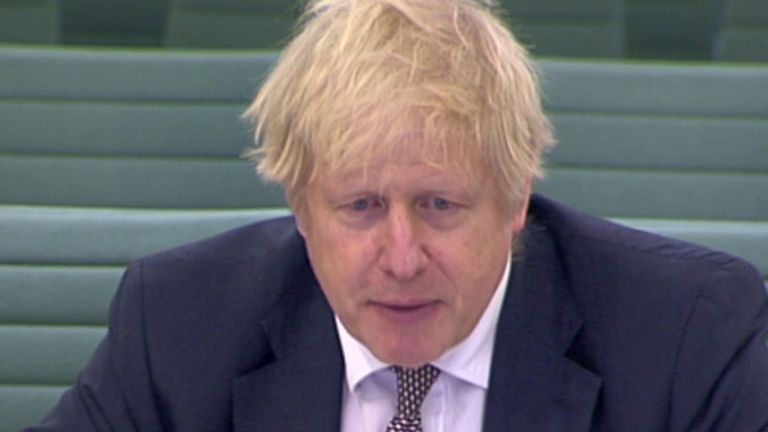COVID-19: One new variant has upended everything - the greatest challenge is now the unknown
The government is unnerved by the massive sense of the unknown when presented with new COVID-19 variants, writes Sky's Sam Coates.
Wednesday 13 January 2021 22:52, UK
The biggest challenge with coronavirus is now the unknown.
Boris Johnson has explicitly acknowledged as much, having done so today in front of senior MPs at his Liaison Committee appearance. When listing the preconditions for schools reopening after the February half-term, he appeared to add one more reason than he had mentioned before.
The PM has previously said that in order to reopen, the vaccine rollout would need to go as well as they hoped with everyone following social distancing rules. But, now, he has added a new one: the new variants - most notably those from South Africa and Brazil - must not prove resistant to the vaccine.
Mr Johnson stressed there was no current evidence of this being the case, but it was still clear that it remains a theoretical possibility that is worrying the government greatly, and could throw the entire timetable for returning to normality by mid-to-late spring off-kilter.
The new British variant - first seen in Kent - has already upended every calculation in place before mid-December.
Even if another variant causes the same proportion of serious cases and mortality, and transmits in the same way, the fact that it is more highly transmissible makes it more dangerous because the sheer volume of cases can suddenly overwhelm the NHS.
One new variant has changed everything. Will this happen again?
The subject of new mutations is worrying scientists that advise the government as there is good reason to think there may be more of them.
I understand that SAGE scientists have even told ministers that the decision to prioritise a single vaccine dose to more people - rather than give people both vaccine doses - means there is an unquantifiable, though probably small, risk of what is known as a "vaccine escape mutant". While they stress it is a risk worth taking to give millions of people a basic level of immunity, this could see new variants of COVID-19 developing.
Britain is in a good place to understand and track new variants, not least because of its oft-criticised testing system, which the PM said today had tested more patients than anywhere else in Europe.
But other countries do not have as sophisticated techniques for monitoring new variants - meaning they can spread easily overseas. This would also make it much harder to stop them coming here.
There are three currently being widely discussed in the UK:
- The new variant first identified in Kent, which is thought to be upwards of 70% more transmissible, and is widely believed to be behind the surge in infections at the end of last year
- The South African variant, which was first revealed to be present in the UK just before Christmas, prompting travel restrictions to be imposed
- The Brazil variant, of which little is known but is now causing concern within Downing Street
Subscribe to the Daily podcast on , , ,
The impact of coronavirus variants - those that exist and those that develop in the coming months - is only one of two massive unknowns unnerving the government. The other is whether or not those who have had the vaccine can continue to infect others.
There is a large-scale study under way at the moment to determine whether this is the case, but the prime minister could not tell the Liaison Committee today when it would conclude. This will be a huge moment, and is hotly anticipated inside Downing Street.
The expectation - as NHS Medical Director Steve Powis said on Monday - is that the vaccine will reduce infections. Early data from Israel suggests it might. But if it doesn't, social distancing could be here with us for a long time yet.






